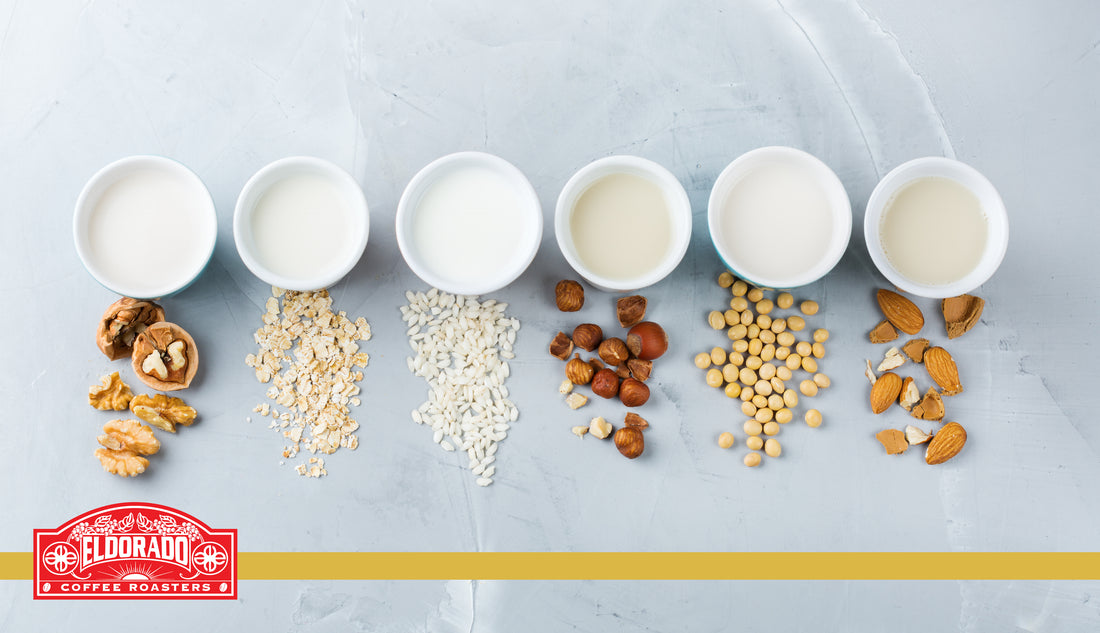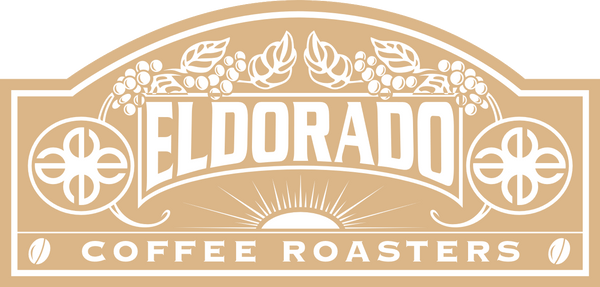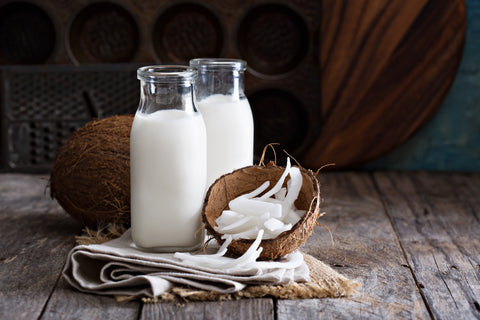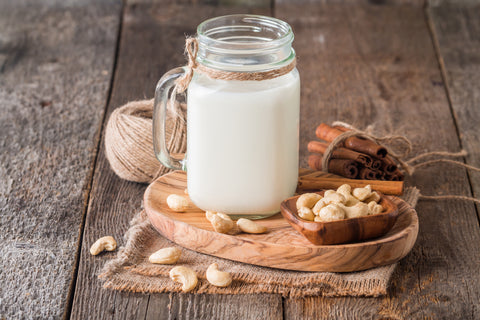
The Complete Guide To Alternative Non-Dairy Milks To Try With Coffee
Share
Not everyone wants to use, or can use, dairy in their coffee. But, everyone deserves to have a creamy, light cup of coffee, if they want it! Thankfully, there are a number of plant-based alternative milks without dairy that can work for every diet and lifestyle.
The problem is that there are actually too many great non-dairy milk alternatives out there. How do you pick the right one? In this guide, we’ll bring you through all of the major non-dairy milk options for coffee. We’ll give you useful information about their taste, texture, stretch, and usage, so you can find and try out different non-dairy milks for your coffee.
But, before we dive in, first thing’s first: a quality coffee beverage starts with quality coffee. Invest in strong coffee beans, brew a good cup—and then you can start experimenting.
Why Use Milk Substitute For Coffee
There are a number of reasons why someone might want to use non-dairy milks in their coffee:
- A lot of people (about 70% of the global population) are lactose intolerant or sensitive to dairy, which can cause digestive troubles or other reactions when consuming dairy products.
- Vegans, or those who don’t want to consume a lot of animal products, might want to steer away from animal dairy.
- For some individuals, plant-based milks can be used as a supplement in their diet. Some plant milks contain nutritional content that could heighten and enhance your health.
But, just because you’re not consuming dairy doesn’t mean you shouldn’t have your coffee exactly the way you like it.
There are a number of alternative milks on the market that can be used for cooking, baking, drinking, and pouring into your java. It’s just a matter of choosing the right milk for you. So, let’s start chatting about the best milk substitutes for coffee.
How To Choose The Best Milk For Coffee
After investing in a quality roast, There are three factors you need to think about when choosing your milk alternative:
- Taste
- Texture
- Stretch
Taste
If it doesn’t taste good, what’s the point? Everyone has a different taste palette, so this variable will be mostly up to you. We’ll give you the basic flavors of each milk, so you can decide for yourself what might work best.
Keep in mind that a type of milk might taste good on its own, but it doesn’t pair well with the acidity of the coffee. Just because you like almond milk in your cereal, doesn’t necessarily mean you’ll love it in your coffee.
Texture
There’s nothing worse than brewing the perfect cup of coffee—and then having it watered down by your milk. You want the texture of your milk alternative to be creamy and smooth, and ideally the same “weight” as the coffee to avoid weakening the flavor.
Stretch
“Stretch” refers to the milk’s ability to foam up. This is used for steamed drinks, like a cappuccino or latte. If you want to make latte art, you need a milk with strong stretch so it’ll be easy to work with.
How does “stretch” actually work? The protein molecules in dairy or plant-based milks soften when they’re heated. Adding air into the milk causes the proteins to trap air, creating a bubbly foam. The protein molecules in traditional dairy milk are strong enough to create these bubbles, but not all alternative milks have a high enough protein content for this.
A note on curdling
We hate to include this, but it’s a must. Some milks will curdle when they come into contact with hot beverages. There are ways to prevent your non-dairy milks from curdling, but that being said—you’ll want to be aware of the potential for curdling when using different milk substitutes, so you don’t end up with a ruined cup of coffee (and a really bad stomach ache).
The types most known for curdling are almond and soy milk. A lot of milk curdles when you pour it in hot coffee. When in doubt, heat your milk first before putting it in coffee to avoid those nasty curdles.
Almond Milk
Almond milk has become a popular coffee additive for cafes and homes alike. It’s a healthy milk, filled with nutrients like protein, fiber, vitamin E, zinc, magnesium, potassium, and iron. It’s also free from cholesterol, so it’s a heart-healthy option. It also comes in a lot of varieties with different flavors, and sweetened/unsweetened options to suit your palate.
Taste
Almond milk has a naturally nutty flavor. Unsweetened varieties can often taste bitter or tangy, especially in coffee, though. Sweetened almond milk has a smoother taste, but it still might not blend with stronger coffee roasts.
Texture
Almond milk has a thin texture, so it’s not going to give you that “creamy” sort of feel. Its thin texture makes it great for baking and cooking, but it can sometimes taste watery in coffee.
Stretch
Almond milk thins out when heated, so it’s not easy to make a foam with. There is protein in almond milk, so it’s possible to steam it for latte art, but you’ll have to use a lot of milk which usually ends up weakening your coffee too much.
Pros
- Loaded with nutrients
- Delicious flavor
- Lots of different kinds of almond milks to choose from
Cons
- Thin texture
- Low stretch
Soy Milk
Another popular option, soy milk has been a non-dairy alternative in coffee shops for years. It’s one of the most affordable and accessible milk substitutes, so you’ll find it in a lot of cafes and homes.
Taste
Soy milk has one of the best flavor profiles on this list. It’s smooth and velvety, sweet and nutty. It has almost no aftertaste, so you’ll still get the strength of the coffee flavor first and foremost.
Texture
Soy milk is thick and creamy, so it works well in coffee. There are also some companies that make soy milk specifically for coffee additives, which makes it even creamier and stronger for steaming purposes.
Stretch
Soy milk has a thick consistency with strong proteins, which gives it a good stretch. Baristas often prefer to use soy milk over other forms of non-dairy milk when creating a cappuccino or latte.
Pros
- Sweet flavor
- Creamy consistency
- Good stretch
Cons
- Pricey
- May be too estrogenic for some diets
Oat Milk
Oat milk is quickly becoming the hot new favorite in the non-dairy world, and for a good reason. Its taste and texture are reminiscent of regular dairy milk, and it has a high fiber content that helps with digestive health. Your coffee will taste creamy—and your tummy will like it, too!
Taste
Oat milk is rich and sweet. Its gentle flavors pair beautifully with the bitter undertones of strong coffee and espresso.
Texture
Oat milk is one of the fullest bodied non-dairy milks on the market. It almost tastes like full fat milk. You’ll love the way it sits in both the cup, and in your mouth.
Stretch
It’s easy to froth and steam oat milk. It has enough proteins for a solid stretch, making it our number one non-dairy choice for latte art beginners.
Don’t be totally fooled by oat milk’s thick consistency, though. It’s important to note that it might create larger bubbles than regular dairy milk, because of its lower protein content. So, be careful not to over-steam, or it’ll come out looking like soap.
Pros
- High fiber content
- Sweet taste
- Creamy texture
- Good froth
Cons
- Sometimes made with canola oil, which can be unhealthy for certain diets
- Possibility of oat sensitivity
Coconut Milk
Coconut milk is probably our healthiest alternative milk on this list. It’s thought to be antibacterial, antifungal, and antiviral. Coconut has a lot of vitamins and nutrients that strengthen the immune system, and promote overall wellness. It can also help regulate blood sugar, so you’re less likely to see a “crash” after your coffee caffeine has worn off.
Taste
Coconut milk has a distinct flavor profile that’s slightly more tropical and sweet. It’s kind of a love-or-hate flavor—so try it out for yourself and see. When paired with coffee, it loses some of that piña colada taste, leaving behind a simple sweetness.
Texture
Coconut milk is naturally very dense. It works great as a creamer, and it won’t water down your coffee. You can also purchase coconut creamer that’s similar to a half and half consistency.
Coconut milk is a little bit oilier in the mouth, so it can sometimes make coffee feel too heavy for some people. Try it out to see for yourself.
Stretch
Coconut milk doesn’t have a lot of proteins, and it’s not as dense as other types of milk. It can be hard to froth it up enough to get volume for latte art or steamed beverages.
Pros
- Healthy
- Unique taste
- Super creamy
Cons
- Unique taste (yes, this can be a con, too!)
- Heavy and oily texture
- No stretch
Cashew Milk
Cashew milk is becoming a more popular nut milk to use in coffee because of its texture. It’s very versatile in its use, and a lot of baristas are moving towards house-made cashew milk as their favorite dairy alternative. You can even make it at home, if you want to try experimenting!
Taste
Cashew milk has a slightly sweet taste, and it’s less nutty than other nut milks (like almond). It has a pretty neutral aftertaste, so you can focus on the delicious flavors of your coffee first and foremost.
Texture
Cashew milk is heavier than almond milk, so you won’t get that watered down taste. It’s still not as creamy as other types of milk, though. If you like a light cup of coffee, cashew milk might not be your first choice.
Stretch
Cashew milk will stretch, but the bubbles tend to be pretty big. This makes the foam less dense than dairy milk, and it can even have a soapy texture to it. It works well in cold coffee beverages, but can be tricky to get right in hot drinks. We recommend heating cashew milk for your cup, but it’s not the best for foamed-milk beverages, like lattes or cappuccinos.
Pros
- Tasty
- Not-too-thin consistency
Cons
- Not creamy
- Low stretch
Hazelnut Milk
Although it’s a less popular nut milk, we’re pretty obsessed with hazelnut milk over here at Eldorado. Hazelnuts are incredibly healthy; they’re good for the heart, they’re packed with vitamins (especially B vitamins), and is rich with healthy oils, which may help lower cholesterol and manage blood sugar. Plus, hazelnut milk in coffee creates a pairing that’s truly decadent.
Taste
Hazelnut milk is sweet and nutty. Have you ever tried Nutella? Imagine you removed the chocolate—That’s what you’re left with in hazelnut milk. Now, put that in a cup of coffee, and it’s like a dream.
A lot of coffees have hazelnut undertones, so hazelnut milk helps to enhance and invigorate these flavors. We’ve found that it pairs well with our Nuconcept Blend and other mellow coffees.
However, hazelnut milk might be a little too nutty for some people. Some people have an affection for hazelnut, while others dislike it—so you’ll probably want to try it out yourself.
Texture
Hazelnut has a unique, thin-yet-creamy consistency. It sort of tastes like ice cream soup—It has the thickness of creamy, melted ice cream. It definitely won’t water down your drink, but you won’t get the same sort of “creamer” quality you might with other milks.
Stretch
Hazelnut milk doesn’t stretch well. The milk bubbles too easily, so it’s hard to get the thickness needed for a froth.
Pros
- Super healthy
- Sweet taste
Cons
- Thinner consistency
- No stretch
Other Non-Dairy Options
There are a few other types of non-dairy milk you’ll find out there—We’ve only given you our favorites. We’ll run through them now, so you can get a good idea of what’s available for you to try out.
Rice Milk
Rice milk is a healthy option, because it’s low-fat and cholesterol-free. It also doesn’t have nut or soy, so it’s the best for those with allergies or sensitivities.
It has a neutral taste, but its texture might be unpleasant for coffee. Some rice milks are thick and starchy, while others are thin and watery. It also doesn’t have enough protein to steam or foam.
Pea Milk
Pea milk is made from yellow peas, so you won’t be putting any green in your coffee. It has a high protein content, so it’s great for foaming. It also has a lot of potassium and nutrients, and it has a pretty neutral taste. Baristas like that the foam has a silky, smooth texture, which makes it great for lattes and latte art.
There’s some debate over the healthiness of pea milk compared to other non-dairy alternatives, though. You can’t really make pea milk without adding a bunch of stuff to it, and this can take away the rich authenticity we prefer here at Eldorado.
Goat’s Milk
We know, this one isn’t a non-dairy option. However, most people can actually tolerate goat’s milk, even if they can’t handle other forms of dairy. Plus, goat’s milk has even more calcium than cow’s milk, so it’s a great option if your body is craving some calcium. It also boosts iron, lowers cholesterol, and includes prebiotics good for digestive health.
Goat’s milk is a healthy option, but it can taste a little sour in yogurt. It’s not really thick or creamy, so it’s not an ideal choice for your morning brew.
Best Non-Dairy Milk
There are a lot of milk substitutes out there. From nut milks to soy and beyond, you’re sure to find a non-dairy option that works for you.
If you’re asking for our opinion, we think the best non-dairy milk for lattes is either oat milk, soy milk, or coconut milk. Nut milks work better if you’re looking for just a little bit of a lighter color to your coffee.
Try out all the non-dairy options with your favorite Eldorado coffee and see what works for you!


